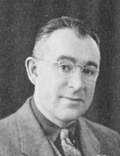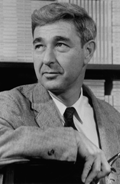
A 1925 alumnus of Hamilton College, he took his M.A. and Ph.D. at Penn, then taught at Rice and Louisiana State Universities. He had already published several books in print including his Short History of Western Civiliazation when World War II broke out. After serving as a Major in intelligence, winning the Legion of Merit and Bronze Star, he returned to Penn in 1946 as an associate professor in European history, becoming full professor in 1955 and department chair in 1965-67.
Dr. Case wrote extensively on war and diplomacy, and was much in demand as a reviewer. He also served as editorial advisor to Crowell Colliers Publishing Co.; co-founded the European Historical Society of the U. S.; and was active in numerous international societies.
He is survived by his wife, Doris Fellows Case; a son, Ronald; a daughter, Beverly Rorer; a sister; four grandchildren; and seven great-grandchildren.

Born March 21, 1898, Morris Simon Viteles earned all of his academic degrees at the University of Pennsylvania, from the B.A. in 1918 and M.A. in 1919, to the Ph.D. in Psychology in 1921. Among his many awards were an honorary LL.D. from Penn in 1973, and the 1989 Psychological Professional Gold Medal Award of the American Psychological Association.
Dr. Viteles spent his entire scholarly and professional career here, appointed an assistant professor of psychology in 1925, associate professor in 1935, and full professor in 1940. He served as Dean of GSE from 1963 to 1967 and became an Emeritus Professor in 1968.
"Intellectually a scientist, professionally a practitioner, and personally a Renaissance man, Morris Viteles was unique in his contributions to more than a half a century of the history of psychology in America and abroad," said Dr. Kenneth George, a current GSE associate dean whose career here began during the Viteles deanship. "Through seminal publications and participation in field applications in the developing role of psychology in industry, he demonstrated how research-based psychology was used for the benefit of society, and he was a dominant figure in developing contacts with psychologists in other countries."
In 1921, Dr. Viteles established at Penn the first vocational guidance program affiliated with a university. Then, through research and teaching at the University--plus extensive visits to research centers in Europe, and consulting experiences with the Milwaukee Electric Railway and Light Company and the Philadelphia Electric Company--he prepared a series of comprehensive reviews of the developments in industrial psychology both here and abroad for the Psychological Bulletin in the late 'twenties. This in turn led to his 1932 book, Industrial Psychology. Published when he was only 34, the book not only established him as a leader in the field but also served to define the field itself. That"Bible" of industrial psychology was supplemented in 1953 by the 500-page, Motivation and Morale in Industry , his definitive work in still another emerging aspect of the profession.
An early contribution to the field of vocational guidance was the publication in 1938 of Vocational Guidance Throughout the World, in which Dr. Viteles described the state of the field based on his extensive international contacts and professional knowledge of developments in all parts of the world.
From early in his career, Viteles espoused a broad international view, Dr. George said. Spending a year in Europe on an American Field Service Fellowship in 1922-1923), he later went to the Soviet Union as a Social Science Research Fellow (1934-1935), and played an early and continuing role in the International Association of Applied Psychology, of which he was president from 1958 to 1968. He became an honorary member of the Italian Society of Scientific Psychology, the Spanish Psychological Society, and the Psychological Society of France. He was also a member of the National Institute of Industrial Psychology of Great Britain.
At home, he served as Chair of the Consulting Division of the American Psychological Association and president of the Pennsylvania Psychological Association, and was active in the American Association for the Advancement of Science, the Industrial Relations Research Association, and Training Directors of America.
Dr. Viteles modeled the role of the scientist-practitioner long before the American Psychological Association adopted the concept as a role model for psychology, Dr. George said. "Throughout his long career at the University, he was able to combine a full-time professorship involving research, teaching, and student mentoring with a staff position at the Philadelphia Electric Company as Director of Personnel Research and Training. Neither role was slighted. In fact, he used this dual role to demonstrate the effective interaction of science and profession and of research and practice."
Dr. Viteles maintained longstanding consulting relationships with the Yellow Cab Company of Philadelphia, the Technical Board of the U.S. Employment Service, and the Bell Telephone Company of Philadelphia.
During World War II, he applied his scientific knowledge and professional skills to research and practice in the armed forces, chairing the National Research Council Committee on Aviation Psychology; supervising research projects for the National Defense Research Committee, and serving as consultant to the War Manpower Commission, the U.S. Navy, and the U.S. Air Force.
"Throughout his life, Dr. Viteles maintained broad intellectual and cultural interests," Dr. George recalls. "He was fluent in French and was interested in art and music; he consistently espoused a humanistic approach to education in general and to psychology as a field. Up to the time of his death, he remained active in his community, attended cultural events in Philadelphia and New York, still read French novels, and exemplified a modern Renaissance man." His wife, Rebecca, passed away in 1985.
Dr. Viteles's wife, Rebecca, passed away in 1985. A memorial service will be held early next year at Medford Leas, in Medford, New Jersey. Contributions in his memory may be made to the Morris S. Viteles Award in Psychology or the Psychology Graduate Research and Book Fund of the Department of Psychology at the University of Pennsylvania.
Above: Dr. Viteles in an early photo used in William Brickman's 1986 history of GSE

He continued to write and lecture worldwide until October 23, 1996, when, unable to finish the semester, he met his class and presented his last lecture--appropriately, an introduction to Moby Dick. He died December 12 at the age of 76.
Dr. Cohen was the executive secretary of the American Studies Association, 19561961, and editor of the American Quarterly, 1958-1970 and one of the founders of the American Studies movement in American higher education. This integration of literature, folklore, history, the arts, technology and religion became the academic discipline American Civilization. In 19731974 he was the first Visiting Fulbright Professor of American Studies at the University of London.
Hennig Cohen was born in Darlington, S.C. on August 26, 1919, and received a B.A. in 1941 and an M.A. in 1948 from the University of South Carolina. In 1951 he received his Ph.D. from Tulane University. Among his other honors were a Guggenheim Fellowship, 1960; Newberry Library Fellowship, 1976; National Endowment for the Humanities Fellowship, Winterthur Museum, 198081, and the award for Service to Scholarship from the American Literature Association, 1991.
Throughout World War II he served in the U.S. Army Air Force, where as a radio operator and aerial gunner with the 8th Air Force, he was decorated with the Air Medal and five oak leaf clusters. From 1946 to 1956 he was the Director of Public Relations for the University of South Carolina at Columbia.
Dr. Cohen lived in Swarthmore, where, when not occupied with his scholarly pursuits, he was an avid gardener. He is survived by his wife Merrie Lou (Conaway) whom he married in 1946; sons, David (a Penn alumnus who took his B.A. in 1970 and Ph.D. in 1985 and is director of libraries of the College of Charleston, S.C.), Mark (an administrator in the Boston Police Department; and Jonathan (Penn B.S.N. '79, a novelist and movie script writer of Swarthmore); a brother, David, of Darlington, S.C.; and six grandchildren.
-- Ezra Krendel, Professor Emeritus of Statistics and Operations Research
Above: Dr. Cohen in a Frank Ross photo, c. 1966, courtesy of the University Archives
An alumnus of Bates College, Dr. Oliver took his doctorate in education at the University of Colorado in 1948 and taught at Penn from that year until his retirment in 1980.
He is survived by his wife, Barbara Bool Oliver, a longtime administrator of the University now retired. Contributions may be made in Dr. Oliver's memory to the American Heart Association, 625 West Ridge Pike, Suite 100, Building A, Conshohocken, PA 19428.
Almanac
Volume 43 Number 16
December 17, 1996
Return to Almanac's homepage.
Return to index for this issue.